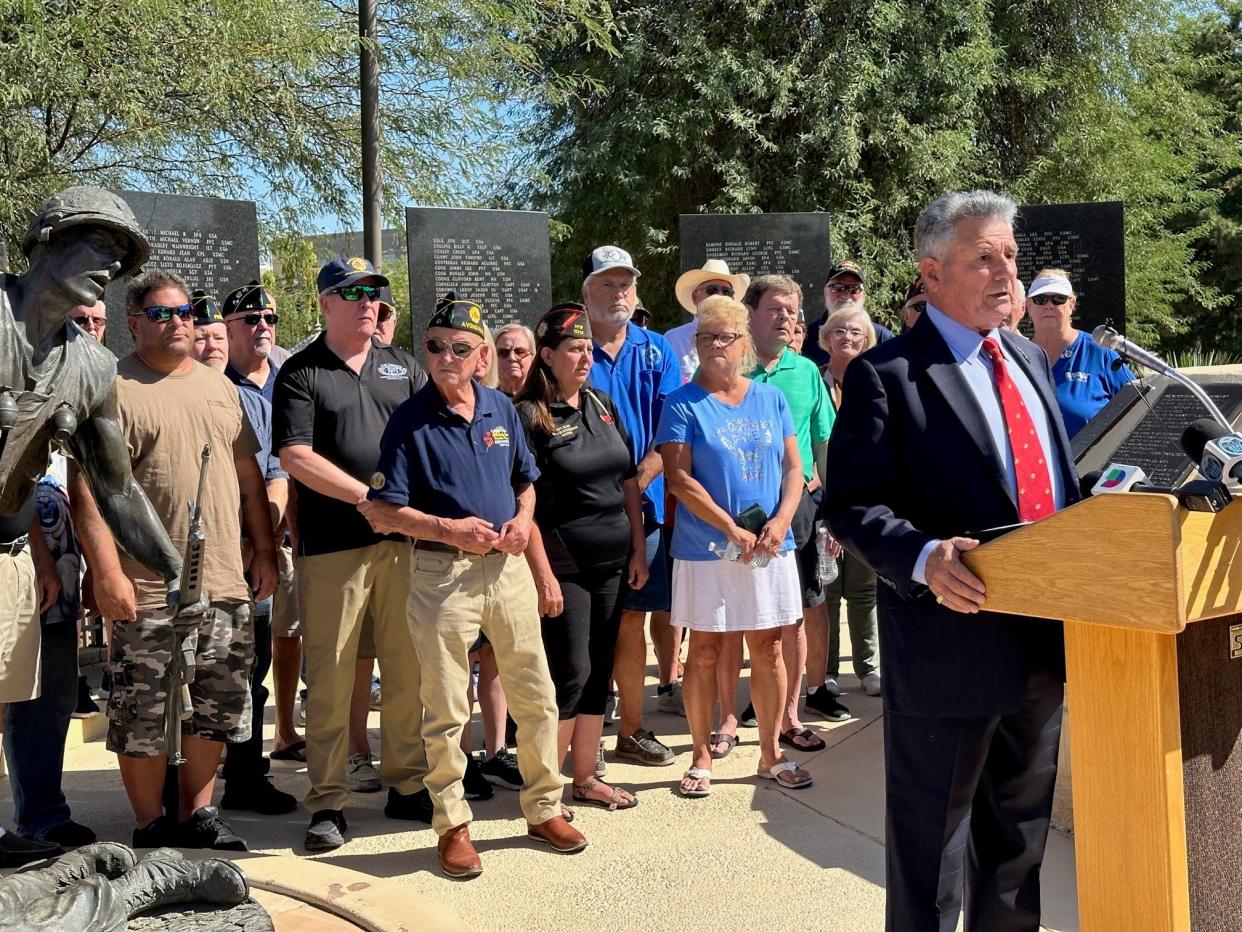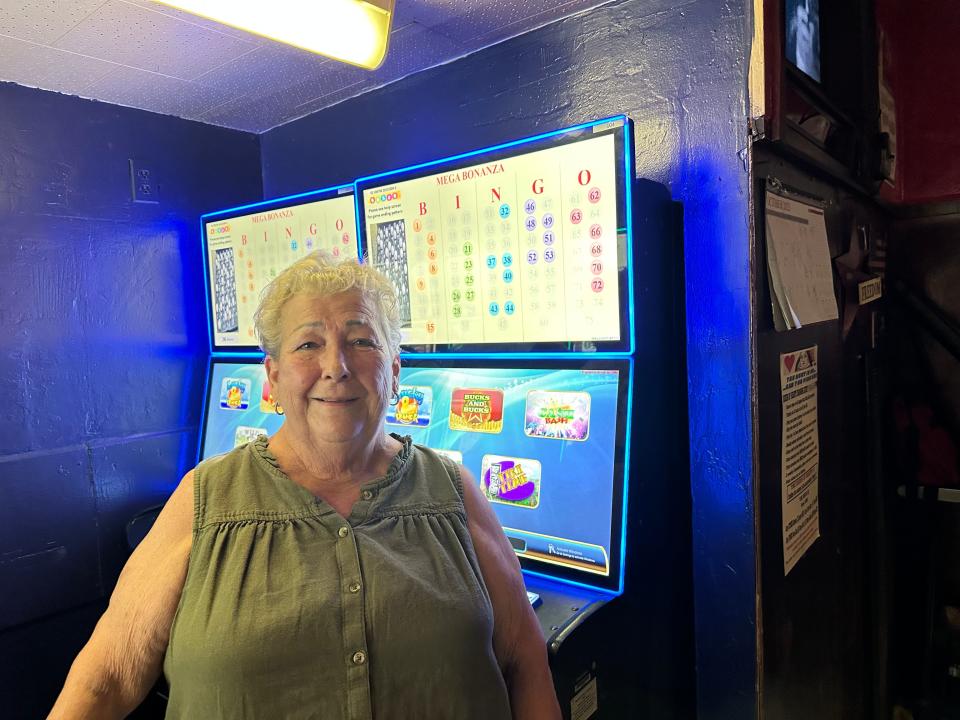Veterans bingo business 'grossing well over $1M per month' after law pushed by Sen. Borrelli

- Oops!Something went wrong.Please try again later.
The Lake Havasu City gaming entrepreneur who worked with a state senator in 2017 to legalize bingo machines in veterans halls in Arizona boasted online this year that his business has been "grossing well over $1M per month."
Online statements by Greg Mullally, the entrepreneur being prosecuted in Maricopa County on 13 felony counts related to the machines along with three other men, made clear to his Montana high school alumni website that the law meant big money for him and his company, Lynxx Gaming.
Besides his profile questions and answers on the site that detail how much his company makes, Mullally predicted in 2017 that bingo-machine law would be lucrative for him.
"This bill, one I wrote and which was carried through the legislature by Mohave County senator Sonny Borrelli, will allow us to start placing gambling type equipment off the reservation in AZ," states an Aug. 14, 2017, post on the website www.helena63.com. "It is potentially the biggest expansion of legal gambling in the US this year. Lynxx will be extremely busy as we've already book orders for hundreds of units. There goes retirement (again)."
Sen. Sonny Borrelli, R-Lake Havasu City, told the news media last week that the machines have become invaluable financial resources for veterans groups, even though he sold the idea to fellow lawmakers 6 years ago simply to prevent veterans groups from being sued for failing to comply with the Americans with Disabilities Act.
Mullally, who's 77, downplayed the messages when asked about them by The Arizona Republic, saying the law didn't create the "biggest" gaming expansion that year and noted that gross revenue of $1 million per month doesn't mean he's making that much in profit.
"I can show you a lot of people who are grossing a million dollars a month and are still losing money," he said, declining to detail Lynxx's financial situation.
Mullally said he sold the company about three months ago and he's in the process of relinquishing his ownership. He declined to name the new owner.
Borrelli said he has no financial relationship with Mullally.
Sen. Sonny Borrelli: The Arizona senator demanded all counties stop how they count ballots.
Mulllally said Borrelli does not have any stake in Mullally's business.
Campaign finance records show no donations from Mullally to Borrelli going back to Borrelli's first election in 2012.
Bill's consequences went unexplained in 2017
Lynxx has put hundreds of the machines in veterans halls, including American Legion and Veterans of Foreign Wars facilities, since the law passed. Lynxx and the organizations make money by taking a cut of the machines' gaming profits.
The machines look and play like slot machines but utilize an underlying bingo game in an attempt to comply with state law. Employees of the veterans halls draw bingo balls in the morning and have the numbers transmitted to the bingo machines, allowing the machines to meet a requirement for live ball draws.
Players push a button and see slot-style spinning wheels displayed prominently on a video screen. Wins seem to occur because items on the wheels match. Money credits stored in the machine rise or fall during gameplay. But the wins or losses actually correspond to matches on a tiny bingo card that is shown in a corner of the same screen. Players may have no idea they are actually playing bingo.
Regulators and Maricopa County prosecutors say the machines don't comply with earlier state laws that allow nonprofits to hold traditional bingo games and have been warning about the machines since 2017. In recent weeks, agents with the state departments of Gaming, Revenue and Liquor Licenses and Control have been entering American Legion and Veterans of Foreign Wars posts that use the machines and warning employees that they could be opening themselves up to criminal liability.
Arizona law bans most forms of gambling except on tribal lands, and compacts between the state and tribes contain a "poison pill" provision that would allow tribes to set their own gaming rules if the state permits competing gaming operations.
Mullally, who made a fortune after winning a Montana court case in 1975 that legalized bingo machines, wrote a second bill sponsored by Borrelli in 2017 that would have allowed bingo machines in Arizona bars. Borrelli sold that bill, which was changed to also allow keno, to fellow lawmakers as a significant revenue enhancer for the state and for veterans organizations.
The bill failed in committee after Judy Ferreira of the Arizona Indian Gaming Association and Mike Bielecki, a lobbyist who works for the Navajo Nation, told the lawmakers it could trigger the "poison pill" provision.
The bingo-machine bill for nonprofit organizations, Senate Bill 1180, didn't receive similar pushback and garnered nearly unanimous support by lawmakers. Katie Hobbs, then a state senator and now Arizona's governor, voted for it.
Borrelli told The Arizona Republic last week he "ran this legislation to take care of these clubs." But in a 2017 committee hearing, Borrelli said the bill was designed solely to allow veterans halls to avoid being sued for lack of ADA compliance. He didn't mention any financial incentive for the veterans halls or gambling firms.
Ferreira didn't testify on the bill, while Bielecki testified that the Navajo Nation could tolerate it because of an amendment that states the machines would "function only as electronic substitutes for bingo cards."
County prosecutors referenced that language in the criminal case, saying the Lynxx machines instead present "an entertaining display which could be interpreted as being more than just the substitute for a paper bingo card."
Bielecki didn't return calls for this article. Ferreira said the Arizona Indian Gaming Association had no comment on the matter.
Bingo money helps charities
When the Luke-Greenway American Legion Post 1 near Seventh Avenue and Van Buren Street needed a new compressor recently for its air conditioner, it used $2,500 from the profits of its eight bingo machines, said Linda West, who runs the post.

"Especially since pandemic, most of the clubs rely on these for their utilities," she said. "You pull all these out, then we can't afford utilities and stuff because of the economy. So then everybody starts shutting down. Where do the veterans go then?"
The bingo money also enhances the post's charity work, including paying for many local families' school supplies, West said.
Two weeks ago, five state agents from the gaming and liquor departments entered the post and "threatened" the bartender and other employees with misdemeanor charges for operating the machines, she said. They left the post without writing any citations when told that a specialist from Lynxx Gaming was on the way, she said.
In 2020, the Maricopa County Attorney's Office seized more than 300 of the machines from nonprofits and veterans halls. The office later returned them to Lynxx because of a new law that denies prosecutors the ability to forfeit ownership of allegedly illegal items without first obtaining the owner's conviction.
County prosecutors, with the help of the state agencies including Gaming, then launched a criminal case against Mullally and three men connected to the Lynxx operation: Randall Leonard, Frank William Meyer and Russell Anthony Pandina II. The case was tentatively set for trial in February.
Possessing an illegal bingo machine is a misdemeanor, but the defendants have been charged with multiple felonies related to allegations of running a gambling enterprise.
For subscribers: Gamblers wagered billions on sports in Arizona in 2023. These companies dominate the market
Borrelli said he maintained a "hands-off" approach to the problem under former Gov. Doug Ducey's regime and let the parties work through their "litigation." Under Hobbs, he's hopeful the state agencies will decide to work with Lynxx to forge a compromise that allows the bingo machines to stay. A new law isn't the solution because, in his opinion, the 2017 law legalized the machines for nonprofit groups and should not be "interpreted" otherwise by state officials.
"This comes down to state agencies imposing their will by basically unelected bureaucrats," Borrelli said.
Mullally, who was at the American Legion post last week, said he's not worried about going to prison and expects to win the fight with Arizona. He's "relatively wealthy" and has spent more than $500,000 on the civil case, he said, adding that he'll make sure the other defendants "don't run out of money" in the fight, either.
"I have no idea what the state wants to do, but they ain't gonna run us off," he said. "And we're going to take it to the bitter end."
Asked if he would accept a resolution in which he and his co-defendants escape punishment but the machines were still considered illegal, Mullally raised a middle finger.
"There's the answer," he said, laughing.
Reach the reporter at rstern@arizonarepublic.com or 480-276-3237. Follow him on X @raystern.
This article originally appeared on Arizona Republic: Greg Mullally's bingo firm profits from law pushed by Sen. Sonny Borrelli

